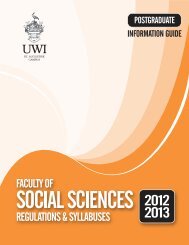Faculty of Humanities and Education (Postgraduate) - The University ...
Faculty of Humanities and Education (Postgraduate) - The University ...
Faculty of Humanities and Education (Postgraduate) - The University ...
You also want an ePaper? Increase the reach of your titles
YUMPU automatically turns print PDFs into web optimized ePapers that Google loves.
POSTGRADUATE REGULATIONS & SYLLABUSES 2012 - 2013<br />
THE FACULTY OF HUMANITIES & EDUCATION<br />
Richardson, W. (2009). Footprints in the digital age. In M. Scherer<br />
(Ed.), Engaging the whole child: Reflections on best practices<br />
in learning, teaching, <strong>and</strong> leadership (pp. 235–241).<br />
Alex<strong>and</strong>ria, VA: Association for Supervision <strong>and</strong> Curriculum<br />
Development.<br />
Sapon-Shevin, S. (2009). Learning in an inclusive community.<br />
In M. Scherer (Ed.), Supporting the whole child: Reflections<br />
on best practices in learning, teaching, <strong>and</strong> leadership (pp.<br />
117–127). Alex<strong>and</strong>ria, VA: Association for Supervision <strong>and</strong><br />
Curriculum Development.<br />
Swartz, R. J. (2009). Energizing learning. In M. Scherer (Ed.),<br />
Engaging the whole child: Reflections on best practices<br />
in learning, teaching, <strong>and</strong> leadership (pp.113–123).<br />
Alex<strong>and</strong>ria, VA: Association for Supervision <strong>and</strong> Curriculum<br />
Development.<br />
Tomlinson, C. A. (2009). <strong>The</strong> goals <strong>of</strong> differentiation. In M. Scherer<br />
(Ed.), Supporting the whole child: Reflections on best<br />
practices in learning, teaching, <strong>and</strong> leadership (pp.3–11).<br />
Alex<strong>and</strong>ria, VA: Association for Supervision <strong>and</strong> Curriculum<br />
Development.<br />
Other resources<br />
Central Public Health Unit Network. (2001). A toolbox for creating<br />
healthy places to learn, work <strong>and</strong> play. Brisbane, Australia:<br />
Author.<br />
Blank, M., & Berg, A. (2006). All together now: Sharing responsibility<br />
for the whole child. Report prepared for the Commission on<br />
the Whole Child. Alex<strong>and</strong>ria, VA: Association for Supervision<br />
<strong>and</strong> Curriculum Development.<br />
Hyles, D., & Prevatt, C. (2008). Life skills workbook for teenagers <strong>and</strong><br />
adults. Toronto, ON: Liberation Practice International.<br />
URL: http://www.wholechildeducation.org/<br />
H<strong>and</strong>outs <strong>and</strong> web resources will be provided as required.<br />
SEMESTER: I AND II<br />
YEAR: I<br />
COURSE CODE: EDLA 5241<br />
COURSE TITLE: DESIGNING INSTRUCTIONO FOR<br />
ADOLESCENT LEARNERS: THE TEACHING OF ENGLISH<br />
NUMBER OF CREDITS: 6<br />
PRERREQUISTIES: NONE<br />
COURSE DESCRIPTION: This course is designed to take<br />
into consideration research into training <strong>of</strong> English teachers.<br />
Specifically, its aims <strong>and</strong> objectives are drawn from the seminal<br />
work on growth <strong>of</strong> pedagogical content knowledge in inservice<br />
English teachers undertaken by Grossman (1990), <strong>and</strong><br />
what constitutes effective English teaching (Applebee, 1989;<br />
Applebee, Langer, Nystr<strong>and</strong>, & Gamoran, 2003; Carbonaro &<br />
Gamoran, 2002; Gamoran & Carbonaro, 2003).<br />
This body <strong>of</strong> research guides this course in English teacher<br />
preparation since it defines what declarative <strong>and</strong> procedural<br />
knowledge trainee teachers need to acquire, as well as what<br />
dispositions to teaching English they should have at the<br />
end <strong>of</strong> the period <strong>of</strong> study. <strong>The</strong> primary focus <strong>of</strong> the course is<br />
developing trainees’ pr<strong>of</strong>iciency in representing their formal<br />
content knowledge <strong>of</strong> English (gained through undergraduate<br />
<strong>and</strong> graduate degrees) in ways that are underst<strong>and</strong>able to<br />
adolescent learners <strong>of</strong> English. Moreover, it prepares trainees<br />
to represent that content through interesting <strong>and</strong> enjoyable<br />
lessons, to deploy research-based instructional approaches<br />
that are responsive to adolescents’ language developmental<br />
needs, <strong>and</strong> to infuse teaching-learning events with perceptible<br />
love for English, whilst demonstrating a caring attitude towards<br />
students.<br />
This is particularly important given the diversity <strong>of</strong> school cultures<br />
into which course participants may eventually be placed, <strong>and</strong><br />
the challenges they may experience in designing instruction<br />
for, <strong>and</strong> teaching, adolescents. In instructional settings, the latter<br />
can range from the highly motivated <strong>and</strong> self-directed on the<br />
one h<strong>and</strong> to the unmotivated <strong>and</strong> reluctant on the other. <strong>The</strong><br />
course equips students with the core competencies required for<br />
negotiating these teaching-learning contexts, <strong>and</strong> guides them<br />
to reflect upon their learning in socially collaborative spaces,<br />
such as wikis, <strong>and</strong> personal spaces, such as journals.<br />
Purpose <strong>of</strong> the Course Rationale<br />
This course is intended to develop course participants’ skills in<br />
designing effective, affective lessons, <strong>and</strong> choosing appropriate<br />
pedagogical strategies for teaching English to adolescents. It<br />
seeks to prepare participants for classroom teaching in a wide<br />
variety <strong>of</strong> school contexts that will require <strong>and</strong> challenge their<br />
creativity, <strong>and</strong> disciplinary knowledge <strong>of</strong> English.<br />
Course Content<br />
<strong>The</strong>re are 5 areas <strong>of</strong> focus as follows:<br />
Orientation to curriculum: this introduces prospective teachers<br />
to three core areas <strong>of</strong> focus that will inform their underst<strong>and</strong>ing<br />
<strong>of</strong> their future work. It takes a macro view <strong>of</strong> the teaching act <strong>and</strong><br />
situates it within the broad context <strong>of</strong> the wider curriculum.<br />
• Principles <strong>of</strong> Instructional Design<br />
<strong>The</strong> focus here is on introductory, core concepts necessary<br />
for students to design lessons <strong>and</strong> units, such as learning<br />
outcomes, instructional objectives, instructional stimulus,<br />
taxonomies, <strong>and</strong> learning activities.<br />
• Integrating Technology in Teaching <strong>and</strong> Learning<br />
This will provide students with the analytical skills to<br />
deconstruct media products <strong>and</strong> explore ways in which<br />
technologies can be used in teaching <strong>and</strong> learning. It will<br />
sensitize educators to the theoretical <strong>and</strong> practical issues<br />
involved in the integration <strong>of</strong> computers, audio-visual<br />
equipment <strong>and</strong> other technologies used for instruction<br />
<strong>and</strong> provide training in the design <strong>and</strong> production <strong>of</strong><br />
educational materials.<br />
65

















